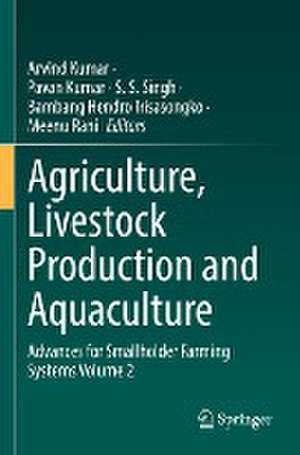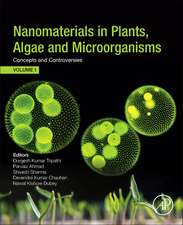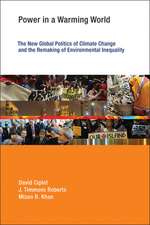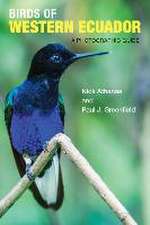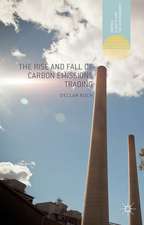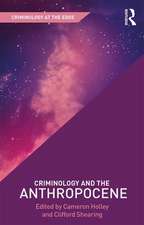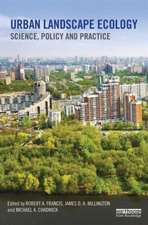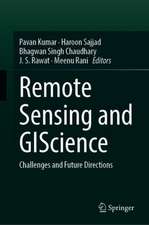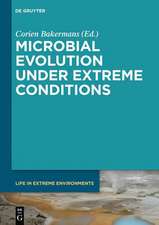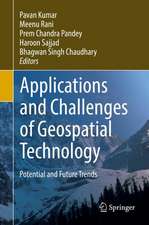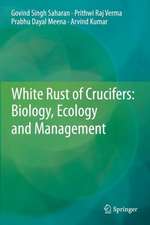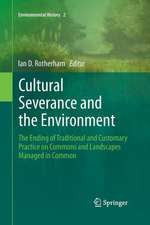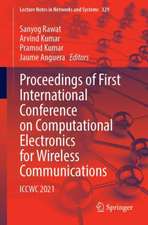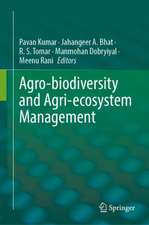Agriculture, Livestock Production and Aquaculture: Advances for Smallholder Farming Systems Volume 2
Editat de Arvind Kumar, Pavan Kumar, S. S. Singh, Bambang Hendro Trisasongko, Meenu Ranien Limba Engleză Paperback – 29 apr 2023
Volume 2 focuses on trends and technologies in food security within the context of sustainable practices, drone technology, microwave data, molecular farming, machine learning, agricultural economics, spatial modeling and agricultural policy. These chapters discuss advancements in fishery resource and aquaculture practices, and also the challenges facing these areas due to climate change.
| Toate formatele și edițiile | Preț | Express |
|---|---|---|
| Paperback (2) | 1002.61 lei 43-57 zile | |
| Springer International Publishing – 29 apr 2023 | 1002.61 lei 43-57 zile | |
| Springer International Publishing – 29 apr 2023 | 1003.84 lei 43-57 zile | |
| Hardback (2) | 1007.97 lei 43-57 zile | |
| Springer International Publishing – 29 apr 2022 | 1007.97 lei 43-57 zile | |
| Springer International Publishing – 29 apr 2022 | 1009.19 lei 43-57 zile |
Preț: 1002.61 lei
Preț vechi: 1222.70 lei
-18% Nou
Puncte Express: 1504
Preț estimativ în valută:
191.84€ • 200.84$ • 158.74£
191.84€ • 200.84$ • 158.74£
Carte tipărită la comandă
Livrare economică 07-21 aprilie
Preluare comenzi: 021 569.72.76
Specificații
ISBN-13: 9783030932640
ISBN-10: 3030932648
Pagini: 321
Ilustrații: XV, 321 p. 79 illus., 70 illus. in color.
Dimensiuni: 155 x 235 mm
Greutate: 0.52 kg
Ediția:1st ed. 2022
Editura: Springer International Publishing
Colecția Springer
Locul publicării:Cham, Switzerland
ISBN-10: 3030932648
Pagini: 321
Ilustrații: XV, 321 p. 79 illus., 70 illus. in color.
Dimensiuni: 155 x 235 mm
Greutate: 0.52 kg
Ediția:1st ed. 2022
Editura: Springer International Publishing
Colecția Springer
Locul publicării:Cham, Switzerland
Cuprins
Chapter1. Drone Technology in Sustainable Agriculture: The future of farming is precision agriculture and mapping.- Chapter2. Revolutionizing Crops and Soil Resources’ Resilience to Climate Change. A case for Best-fit Agronomic Practices in Low and High Input Systems.- Chapter3. Drought-resilient climate smart sorghum varieties for food and industrial use in marginal frontier areas of Kenya.- Chapter4. Optimizing nitrogen management for improved productivity, nitrogen use efficiency, food and nutrition security: African context perspectives.- Chapter5. Soil carbon pools under different farming practices.- Chapter6. Effect of conservation agriculture on energy consumption and carbon emission.- Chapter7. Plant Molecular Farming: A Marvelous Biotechnological Approach in Agricultural Production.- Chapter8. Examining the outcome of coupling machine learning with dual Polarimetric SAR for rice growth mapping.- Chapter9. Mapping prominent cash crops employing ALOS PALSAR-2 and selected machine learners.- Chapter10. Crop assessment and decision support information products using multi-sensor and multi-temporal moderate resolution data.- Chapter11. Agriculture, Livestock Production and Aquaculture: Advances for Smallholder Farming System.- Chapter12. Mobilizing Pig Resources for Capacity Development and Livelihood Security.- Chapter13. Agricultural Value Chains: A Cardinal Pillar for Future Development and Management of Farming.- Chapter14. Climate Smart Eco-management of Water and Soil Quality as a Tool for Fish Productivity Enhancement.- Chapter15. Advances in nutrient resource management for fisheries and aquaculture.- Chapter16. Conclusion.
Notă biografică
Arvind Kumar a renowned educationist and researcher having more than four decades of experience, has been given the responsibility as first Vice-Chancellor, since May 2014, by the President of India to develop the campus and academic program of Rani Lakshmi Bai Central Agricultural University, Jhansi, an Institution of National Importance. Prior to this assignment, Prof. Kumar worked as Deputy Director General (Education), ICAR, New Delhi from 2009 to 2014; held the additional charge of Deputy Director General (Fisheries), ICAR, New Delhi, for about 5 months; and was the Director of the Directorate of Rapeseed-Mustard Research (DRMR), Bharatpur from 2002 to 2009. He is a fellow of the National Academy of Agricultural Sciences (NAAS) (2012) and a fellow of the International Society of Noni Science (2018). He has been also the President of ISOS, ISA, and SRMR. Prof. Kumar received the Lifetime Achievement Award for his significant contributions to agronomy and rapeseed mustard from the Indian Society of Agronomy and Society for Rapeseed-Mustard Research. He has been a member of the Board of Management of several nationally reputed institutions like IARI; GBPUA&T; CAU, Imphal; SKUAS&T, Jammu; and NDRI, Karnal. During his professional career at GBPUA&T, Pantnagar, for about 27 years, he was involved in teaching, research, and extension education and was also assigned various responsibilities, including Joint Director Extension. For his outstanding contributions to the field of rapeseed-mustard research, he was given “Membership” by the International Consultative Group for Research on Rapeseed, Paris (France) from India. Prof. Kumar has been honored for his professional achievements with several awards and fellowships. He has published more than 160 research papers in Indian and foreign journals, 90 popular articles, 60 books/booklets/chapters, and presented more than 200 papers in national and international conferences on aspects of oilseed research and management. He has visited 24 countries for professional reasons and holds a vast National and International experience.
Pavan Kumar is an Assistant Professor (Wildlife Biology) in the Department of Forest Biology and Tree Improvement, College of Horticulture and Forestry, Rani Lakshmi Bai Central Agricultural University, Jhansi, U.P., India. He obtained his Ph.D. degrees from the Faculty of Natural Sciences, Jamia Millia Islamia, New Delhi. He did B.Sc (Botany) and M.Sc (Environmental Science) from Banaras Hindu University, Varanasi, India, and subsequently obtained a Master’s Degree in Remote Sensing (M.Tech) from Birla Institute of Technology, Mesra Ranchi, India. His current research interests include forest, resilient agriculture and climate change studies. He is recipient of Innovation China National Academy Award for Remote Sensing. Dr. Kumar has published more than 60 research papers in international journals as well as authored several books and presented more than 40 papers in national and international conferences. He has visited countries like the USA, France, the Netherlands, Italy, China, Indonesia, Brazil, and Malaysia for various academic/scientific assignments, workshops, and conferences. Dr. Kumar is member of the International Associations for Vegetation Science, USA, and the Institution of Geospatial and Remote Sensing, Malaysia.
S. S. Singh is Director of Extension Education, Rani Laxmi Bai Central Agricultural University, Jhansi, U.P. He has served as director of ICAR-Agricultural Technology Application Research Institute, Kolkata (2017-2020). Dr. Singh has handled 16 foreign/externally funded projects on natural resource management, crop management, livelihood development, and crop improvement funded by DFID, IFAD, USAID, BMGF, IRRI, CIMMYT, Ford Foundation, and European Union. As an agronomist, he has contributed to the development of five rice varieties which have been released by CVRC and Bihar SVRC and are suitable for aerobic drought prone, late direct seeding, contingency cropping, and rainfed lowland conditions. He has published 115 research papers, 6 books, 20 book chapters, 15 technical bulletins, 135 papers in proceedings/ symposiums/seminars, 50 popular articles, and 40 extension folders. He has visited the USA, the UK, Australia, Mexico, Thailand, Philippines, Bangladesh, and Nepal. He is recipient of Rajeev Gandhi Gyan Vigyan Award from the Ministry of Home Affairs, FAI award, Senior Research Fellowship of ICAR, and Excellent Team Research Award of ICAR in Social Science.
Bambang Hendro Trisasongko is an Assistant Professor in the Department of Soil Science and Land Resources, and a member of the Geospatial Information and Technologies for the Intelligent and Integrative Agriculture (GITIIA) research program at Bogor Agricultural University, Bogor, Indonesia. Dr. Trisasongko has 14 years of research teaching experience with a publication record in research articles, review papers, conference papers, and book chapters. Dr. Trisasongko is reviewing research articles for a number of scientific journals and has handled research projects in his capacity as PI and Co PI. His research areas have been in remote sensing for agriculture, environment and forestry. His current research focus in plant productivity from remote sensing and proximal sensors.
Meenu Rani is a Researcher in the Department of Geography, Kumaun University, Nainital, Uttarakhand, India. Dr. Rani received her M.Tech degree in remote sensing from Birla Institute of Technology, Ranchi, India. She got working experience in the major disciplines of agriculture and forestry while working with Haryana Space Application Centre, Indian Council of Agricultural Research, and GB Pant National Institute of Himalayan Environment and Sustainable Development. Dr. Rani has authored several peer-reviewed scientific research papers and presented works at many national and international conferences in the USA, Italy, and China. She has been awarded with various fellowships from the International Association for Ecology, Future Earth Coast, and SCAR Scientific Research Programme. She received an early career scientists’ achievement award in 2017 from Columbia University, New York, USA.
Pavan Kumar is an Assistant Professor (Wildlife Biology) in the Department of Forest Biology and Tree Improvement, College of Horticulture and Forestry, Rani Lakshmi Bai Central Agricultural University, Jhansi, U.P., India. He obtained his Ph.D. degrees from the Faculty of Natural Sciences, Jamia Millia Islamia, New Delhi. He did B.Sc (Botany) and M.Sc (Environmental Science) from Banaras Hindu University, Varanasi, India, and subsequently obtained a Master’s Degree in Remote Sensing (M.Tech) from Birla Institute of Technology, Mesra Ranchi, India. His current research interests include forest, resilient agriculture and climate change studies. He is recipient of Innovation China National Academy Award for Remote Sensing. Dr. Kumar has published more than 60 research papers in international journals as well as authored several books and presented more than 40 papers in national and international conferences. He has visited countries like the USA, France, the Netherlands, Italy, China, Indonesia, Brazil, and Malaysia for various academic/scientific assignments, workshops, and conferences. Dr. Kumar is member of the International Associations for Vegetation Science, USA, and the Institution of Geospatial and Remote Sensing, Malaysia.
S. S. Singh is Director of Extension Education, Rani Laxmi Bai Central Agricultural University, Jhansi, U.P. He has served as director of ICAR-Agricultural Technology Application Research Institute, Kolkata (2017-2020). Dr. Singh has handled 16 foreign/externally funded projects on natural resource management, crop management, livelihood development, and crop improvement funded by DFID, IFAD, USAID, BMGF, IRRI, CIMMYT, Ford Foundation, and European Union. As an agronomist, he has contributed to the development of five rice varieties which have been released by CVRC and Bihar SVRC and are suitable for aerobic drought prone, late direct seeding, contingency cropping, and rainfed lowland conditions. He has published 115 research papers, 6 books, 20 book chapters, 15 technical bulletins, 135 papers in proceedings/ symposiums/seminars, 50 popular articles, and 40 extension folders. He has visited the USA, the UK, Australia, Mexico, Thailand, Philippines, Bangladesh, and Nepal. He is recipient of Rajeev Gandhi Gyan Vigyan Award from the Ministry of Home Affairs, FAI award, Senior Research Fellowship of ICAR, and Excellent Team Research Award of ICAR in Social Science.
Bambang Hendro Trisasongko is an Assistant Professor in the Department of Soil Science and Land Resources, and a member of the Geospatial Information and Technologies for the Intelligent and Integrative Agriculture (GITIIA) research program at Bogor Agricultural University, Bogor, Indonesia. Dr. Trisasongko has 14 years of research teaching experience with a publication record in research articles, review papers, conference papers, and book chapters. Dr. Trisasongko is reviewing research articles for a number of scientific journals and has handled research projects in his capacity as PI and Co PI. His research areas have been in remote sensing for agriculture, environment and forestry. His current research focus in plant productivity from remote sensing and proximal sensors.
Meenu Rani is a Researcher in the Department of Geography, Kumaun University, Nainital, Uttarakhand, India. Dr. Rani received her M.Tech degree in remote sensing from Birla Institute of Technology, Ranchi, India. She got working experience in the major disciplines of agriculture and forestry while working with Haryana Space Application Centre, Indian Council of Agricultural Research, and GB Pant National Institute of Himalayan Environment and Sustainable Development. Dr. Rani has authored several peer-reviewed scientific research papers and presented works at many national and international conferences in the USA, Italy, and China. She has been awarded with various fellowships from the International Association for Ecology, Future Earth Coast, and SCAR Scientific Research Programme. She received an early career scientists’ achievement award in 2017 from Columbia University, New York, USA.
Textul de pe ultima copertă
This two-volume set discusses recent approaches and technological innovations for sustainable agriculture in smallholder farming systems impacted by climate change. The systems covered include crop-based agricultural production, as well as aquaculture and livestock production as related systems using similar techniques to combat food security issues brought about by climate change and resource overuse. The chapters detail innovations involving crop diversification, soil resilience management, geoinformatics and land suitability monitoring for smart farming, information technology in livestock production, and nutrient resource management in fishery aquaculture. Researchers, practitioners and industries will be able to use this information to implement socially and economically sustainable practices to achieve food security in impoverished areas vulnerable to climate change, while also learning about the rapid evolution in information technology that is applicable for and available to small holder farmers.
Volume 2 focuses on trends and technologies in food security within the context of sustainable practices, drone technology, microwave data, molecular farming, machine learning, agricultural economics, spatial modeling and agricultural policy. These chapters discuss advancements in fishery resource and aquaculture practices, and also the challenges facing these areas due to climate change.
Volume 2 focuses on trends and technologies in food security within the context of sustainable practices, drone technology, microwave data, molecular farming, machine learning, agricultural economics, spatial modeling and agricultural policy. These chapters discuss advancements in fishery resource and aquaculture practices, and also the challenges facing these areas due to climate change.
Caracteristici
Discusses approaches to sustainable agriculture in smallholder farming systems
Covers adaptation and mitigation strategies of smallholder farmers in response to climate change
Focuses on trends in food security, fishery resources and aquaculture
Covers adaptation and mitigation strategies of smallholder farmers in response to climate change
Focuses on trends in food security, fishery resources and aquaculture
